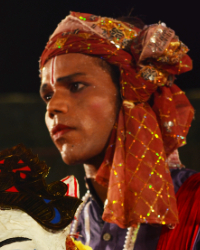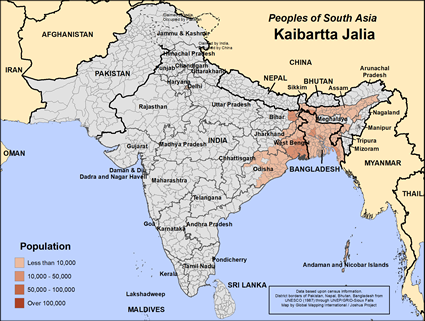The Jalia Kaibarta are an indigenous Hindu people who live in northeast India and the nation of Bangladesh. Their name means "one who depends on the water" in the ancient language of Sanskrit. The Kaila traditionally made their living by fishing and boating. They fish in the freshwater rivers and lakes of the Bengal region and in the saltwater of the Bay of Bengal. Today many Jalia also work as cultivators of the soil on land owned by higher castes. For the most part the Jalia are a scheduled tribe meaning that they are eligible for public jobs and special consideration for places in Indian universities. One group within Kalia are Vaishyas, the merchant caste, and are not a classified as a scheduled tribe. The main language of the Jalia is Bengali. A newly edited complete Bengali Bible became available in 2016. Unfortunately, many Jalia are illiterate and the gospel will need to be shared with them in oral and visual forms. Every day there are Christian radio programs available in Bengali.
Most Jalia men are still fishermen although some work in farming and as daily laborers. Women work at home taking care of domestic responsibilities and raising their children. Some women labor in the fields with their husbands. The Jalia experience discrimination as an indigenous group. They are a low class community, outside the four main castes of the Hindu systems. The educational level of the Jalia is improving. Educated Jalia now work as teachers and administrators. The Jalia marry within their group. Families arrange marriages often when the young people are adolescents. Newly married couples live with or near the groom's parents. Sons inherit property upon the death of their father. Jalia cremate their dead. Caste councils settle legal disputes and promote Jalia interests. Fish, rice, fruit, vegetables, and dairy products make up their diets.
The Jalia pay special devotion to the Hindu Goddess Vasuli Devi. The Jalia show their homage to her every April in a ceremonial dance. Vasuli Devi is a manifestation of the great Mother Goddess. Underneath the veneer of Hinduism, the Kaibartta also believe in the existence of natural spirits, and therefore, are considered by some to be animists. Village elders and priest serve as leaders at important family ceremonies such as births, weddings and funerals. Hindus believe that by performing rituals and good works that they will attain moksha or freedom from the endless cycle of birth, death and rebirth. The Jalia visit Hindu shrines and offer prayers, food, flowers, and incense to their gods in hopes of gaining protection and benefits. They do not have a personal or familial relationship with their gods as Christians do. The yearly holidays of the Jalia people are Holi, the festival of colors and the start of spring, Diwali, the festival of lights, Navratri, the celebration of autumn and Rama Navami, Rama's birthday.
Adult Jalia would benefit from learning new job skills. Their children need good schools and teachers so that they will be able to read and write and improve their place in Indian society. Most of all the Jalia need to hear and understand the life-changing message of Jesus Christ. He alone can forgive their sins and delivery them from their fear of evil spirits.
Pray that the Jalia would be led to tune in on Christian Bengali radio broadcasts and be open to the messages they hear. Pray the Bengali Bibles would get to the Jalia who are hungry for the Word of God. Pray the Lord brings whole Jalia villages and families to Himself. Pray the Lord sends workers to the Jalia to tell them about the Savior.
Scripture Prayers for the Kaibartta Jalia in India.
| Profile Source: Keith Carey |











